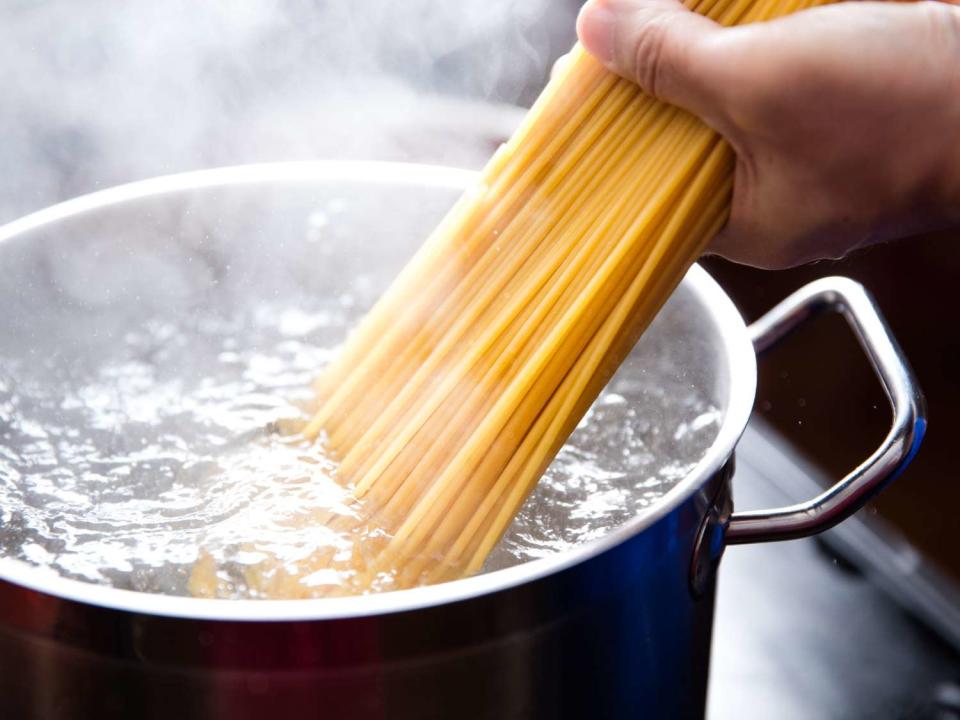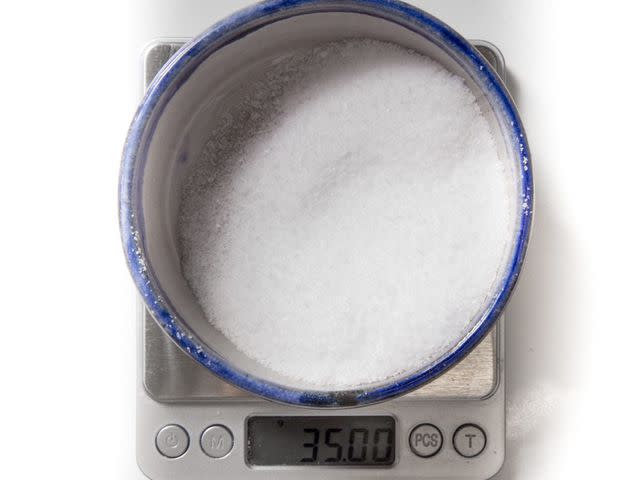How Salty Should Pasta Water Be?
How much salt should you add to a pasta pot? It depends. But never make it "as salty as the sea."

Serious Eats
I am often asked about how much salt should be added to a pot of water for boiling pasta, and I usually just tell people to estimate it. But when someone recently asked me that question, I wondered if there was a more precise amount I should be using, which led me to a more definite question: Just how salty should my pasta water be?
I'm not sure I've ever measured the salt in my pasta water. I just add enough to make the water taste well-seasoned, but not too salty. But I will admit to occasionally overdoing it and ruining my pasta with too much salt, so maybe measuring is a good idea after all.
While I've sometimes over-salted my pasta water, most people I've observed make the opposite mistake, adding far too little. The result is pasta that tastes flat no matter what kind of sauce and cheese is served with it. My guess is that a lot of home cooks get freaked out at the idea of adding a lot of salt to their pot of pasta water, but they 're forgetting one important detail: Most of the salt ends up going down the drain. Add a tablespoon of salt to a quart of cooking water and you'll never ingest that whole tablespoon unless you chug all of the water. (To read about how much water you really need to cook pasta, check out our article here...the answer may surprise you.) Add too little, and the pasta has no hope of being properly seasoned.
But that still raises the question: how much is the right amount? The answer won't be an absolute quantity of salt, but rather a ratio of salt to water.
To find out what it is, I did some side-by-side tests. Before moving on to them, though, it's worth noting a small disclaimer: Salt preferences are highly personal, and what I found to be my sweet spot won't necessarily be to everyone's taste. Some people may want more salt, some less. That said, I did find a workable range that I think most people will agree with.
Testing How Much Salt You Should Use for Boiling Pasta
Setting up this test was easy: All I had to do was cook pasta in several pots of water, each with a different amount of salt, then taste them to see which I liked best. The only question was which salt percentages to try.
I flipped through several Italian cookbooks and online sources, and found a range of possibilities. Paul Bertolli, in his excellent book Cooking by Hand, suggests 5 teaspoons of salt per gallon. Online I saw some folks calling for as much as 1 tablespoon salt per quart of water, whereas some others called for 1 tablespoon for two quarts of water. But what percentages are these?
One of the difficult things about salt is that different types (kosher, fine sea, coarse sea, table) vary in terms of density, which means that a tablespoon of fine sea salt will contain a different amount of NaCl than a tablespoon of kosher salt. Even two different brands of the same type of salt, like Morton and Diamond Crystal kosher salt, will not be the same. Working with weight instead of volume is the best way to eliminate this issue for testing purposes.
Without knowing the exact types of salt Bertolli and everyone else uses, I decided to use fine sea salt, since many Italian experts recommend it. After measuring out teaspoons of salt and weighing them on my precise jeweler's scale (and also converting the quarts and gallons into liters to make calculations easy), I found that Bertolli was suggesting roughly .8% salt by weight (or 8 grams per liter); the one-tablespoon-per-two-quarts people were calling for .95% salt (9.5 grams per liter), and the one-tablespoon-per-quart folks were pointing towards a roughly 1.8% salt solution (18 grams per liter).
Now, some of you may have come across a rule of thumb for salting pasta water that says to make the water as salty as the sea. I've heard that one more times than I can count. How salty is the sea? On average, about 3.5% by weight. That's 35 grams of salt in a liter of water.
Knowing all of this, I decided to cook dried penne pasta in water with the following salinity levels:
0.5% (roughly 3/4 teaspoon fine sea salt per liter)
1% (roughly 1 1/2 teaspoons per liter)
2% (roughly 1 tablespoon fine sea salt per liter)
3% (roughly 1 1/2 tablespoons fine sea salt per liter)
3.5% (roughly 2 tablespoons fine sea salt per liter)

Serious Eats
35 grams of salt per liter, which is the average saltiness of the sea, is way too salty for cooking pasta.Let me start by telling you one very important thing: Never, ever, ever make your pasta water as salty as the sea. That is the worst advice anyone can give. It is repulsively, inedibly salty. Frankly, 3% salt is also way too salty.
Below that, I found the other options work, depending on your salt tolerance. For me, 2% salt by weight was the top end of what's tolerable, tasting very well seasoned but also noticeably salty.
1% (right around the amount Bertolli suggests) was the sweet spot for me: seasoned without a strong salt flavor. For those who are more sensitive to salt, 0.5% still manages to do the trick. (I later tried a few batches below the 0.5% level and found them all under-seasoned.)
The Amount of Salt You Should Use
Depending on your salt tolerance, anywhere from 0.5% to 2% salt by weight will work, with 1% being my preferred level. 2% may work for those who love salt, but keep in mind that it is precariously close to tipping into the too-salty zone. Depending on how salty your sauce and cheese are, and also whether you use the pasta-cooking water to finish the dish (which will concentrate the salt as the water evaporates), 2% could easily put you over the line, so proceed with caution.
Here's a conversion chart to help figure out approximate volumes of salt for most of the major types:
| .5% Salinity | 1% Salinity | 2% Salinity |
Fine Sea Salt | 3/4 tsp | 1 1/2 tsp | 1 TB |
Table Salt | 3/4 tsp | 1 1/2 tsp | 1 TB |
Morton Coarse Kosher | 1 tsp | 2 tsp | 1 TB plus 1 tsp |
Diamond Crystal Kosher | 1 1/2 tsp | 1 TB | 2 TB |
And remember: Under no circumstances should you salt your water as much as the ocean. That's just gross.

